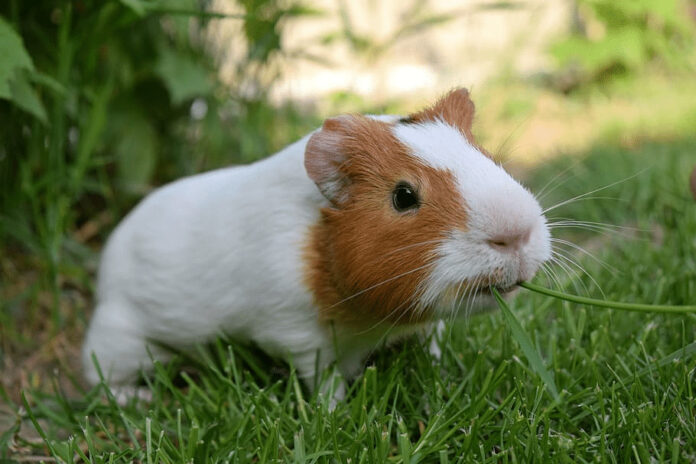Last Updated on November 28, 2023 by Fumipets
| Length: | 8 – 19 inches |
| Weight: | 700 – 1200 grams |
| Lifespan: | 4 – 8 years |
| Colors: | Beige, cream, black, red, gold |
| Temperament: | Active friendly and economical breed of guinea pig that doesn’t bite |
| Best Suited For: | Families and inexperienced pet owners |
The American guinea pig is the first breed of guinea pig to be domesticated. They are a low-maintenance short-haired breed whose disposition makes them ideal for keeping as children’s pets.
The word “guinea pig” has lost its actual origin, although the American variety originated in South America. It is referred to as the English guinea pig in various regions of the globe and has short, straight hair.
What’s the price of an American Guinea Pig?
When compared to many other exhibit breeds, American guinea pigs are fairly inexpensive. The average cost of an American guinea pig is between $10 and $40. They may cost less in certain instances.

3 little known facts about the American Guinea Pig
Let’s talk about some facts about the American guinea pig that you may not be aware of.
1. They are probably the oldest domesticated breed of guinea pig.
The American guinea pig is perhaps the oldest domesticated breed still in existence. It is also known as the English guinea pig in various areas of the globe. It is one of the earliest breeds known to exist, according to the American Cavy Breeders Association.
2. American guinea pigs are very colorful
The American guinea pig has more than 20 recognizable coat varieties. Five categories divide the colors into distinct marks and patterns.
3. American guinea pigs require very little maintenance
American guinea pigs need relatively minimal care due to their short hair. Regular cutting and combing are not necessary, and the hair seldom ever mattes or tangles. Even baths are only necessary when they begin to smell.
Temperament and Intelligence of the American Guinea Pig
The American guinea pig is a calm and sociable pet. It is gregarious, vivacious, and clinging. They are ideal to keep around young children since they are gentle and do not bite. Since they are herd animals and social creatures, having many animals in the same cage seldom causes problems. You can teach these clever creatures to do tricks.
Are These Guinea Pigs Good for Families?
Indeed, American guinea pigs make wonderful household pets. They are ideal as a child’s first pet due to their minimal care requirements. Little more than feeding them once a day and cleaning the cage as necessary will be required from a youngster. The remaining time is spent playing, caressing, training, and exercising; none of these activities needs that your youngster is skilled in any particular way. Additionally, American guinea pigs are non-venomous, so you won’t have to worry about being hurt.
Does This Breed Get Along with Other Pets?
Yes, the American guinea pig is a herd animal that prefers being among other animals, just as other guinea pigs do. Most of the time, if you place two guinea pigs in the same cage, you’ll see them cuddling up to each other to stay warm after a few days. An adult guinea pig may sometimes become used to being alone and not want company, although this is quite uncommon.
Things to know when owning an American Guinea Pig
Let’s go over all you need to know about your American guinea pig.
Food & Diet Requirements
The fundamental food that all guinea pigs need applies to American guinea pigs as well. Make sure there is a consistent supply of timothy hay that is clean and of excellent quality for them to consume. The high fiber content of this diet helps to support a healthy digestive tract while also wearing down their teeth.
The Small Animal Vet Hospital recommends that your guinea pig consume 20% of their body weight in veggies each day. One cup is often advised. To add vitamin C to the diet, the bulk of vegetables should be green, with a lesser part of colorful vegetables. Since vitamin C rapidly degrades, these veggies must be fresh.
Additionally, your American guinea pig will need between 1/4 and 1/8 cup of vitamin C-fortified food pellets per day. These pellets are available for purchase at pet stores, and we advise picking the best brand you can buy.
You may sometimes offer your pet very little amount of fruit as long as it is fresh and rich in vitamin C.

Exercise
Your pet requires plenty of space to roam about and exercise as guinea pigs may stay active for up to 20 hours every day, according to the RSPCA. Experts advise purchasing the biggest cage you can. Guinea pigs don’t like to climb as ferrets do, so make sure the cage has a flat, open space rather than a multi-level setting.
Training
American guinea pigs are intelligent creatures that like playing, particularly when you join them. If you have a lot of time and some sweet treats, they are intelligent enough to pick up quite a few tricks and can comprehend almost any order. The following tricks may be tried out after your guinea pig is a few weeks old.
Litter box
Your favorite trick will probably be teaching your American guinea pig to use the litter box since it will save you time in the future.
Put a litter box in the cage where your guinea pig regularly relieves itself to teach it to use one.
In the litter box, add timothy hay and feces pellets.
Make some noise and reward your pet when it uses the bathroom.
Your guinea pig will use the litter box for the rest of its life once you teach it to do so.
Stand up
It’s just as simple to teach your American guinea pig to use the litter box as it is to teach it to stand up.
While saying “Stand,” hold a goodie over their heads.
Your pet will eventually stand to receive the reward and will have heard the term multiple times by that point.
Repeat this twice daily, and in a few days, your guinea pig should stand on command without the reward being dangled.
Obey Commands
By using the aforementioned method, you may teach your guinea pig to obey any order. The key is to choose a straightforward action that you can persuade them to do. You’ll be astounded at what you can teach your pet if you combine that objective with a word, a reward, and repetition. Once your pet is upright, attempt to train them to do the following skills while also coming up with some of your own.
Roll a ball
Pass through a hoop or tunnel
Sit
Grooming
American guinea pigs need relatively little upkeep and don’t need regular care like brushing. There is no need to bother about washing or cutting the coat; they will only rarely need a bath to eliminate odorous oils that may accumulate on the skin. With this breed, matting and knots are uncommon to occur.
Health and Conditions
Despite having one of the longest lifespans of any guinea pig breed, the American guinea pig nevertheless has the same health issues as other guinea pigs, such as pneumonia, diarrhea, and scurvy.
Pneumonia
American guinea pigs are susceptible to pneumonia, according to VCA Hospitals. Pneumonia in guinea pigs is often caused by bacteria, and many animals carry the illness for years without showing any signs.
Take your pet to the doctor right away if they are not eating, have eye or nasal discharge, or are having breathing difficulties.
Diarrhea
Due to their incredibly delicate digestive tract, guinea pigs are always at risk of developing diarrhea. Sometimes even a little adjustment in diet might start an episode. Diarrhea requires prompt care since it might lead to health issues. Your pet needs to visit a veterinarian if they have diarrhea, weight loss, or dehydration.
Scurvy
Scurvy affects both people and guinea pigs who are deficient in vitamin C. Because they don’t produce Vitamin C in their body like many other animals do and need humans to provide them with the right quantity to be healthy, it is so common in guinea pigs. We advise speaking with a veterinarian if you notice your pet is walking awkwardly or has swollen feet, diarrhea, or an increasingly rough coat.
Urinary Problems
All guinea pig breeds are prone to urinary tract issues. The cause is that many people consume plants with excessive calcium levels. In your pet, the calcium transforms into bladder stones, which may be uncomfortable. In the urethra, bladder stones may potentially get stuck and result in excruciating discomfort or even death. Watch out for frequent urination, a bent-over posture, and bloody urine.
Conclusion
We really hope you have enjoyed reading about the American guinea pig in such detail. This breed makes a wonderful first companion and is ideal for any family. They are non-aggressive, amiable, trainable, and have a long lifespan. That’s difficult for a kid to top it. Please spread the word about this American guinea pig information on Facebook and Twitter if you find it to be useful and interesting.


















